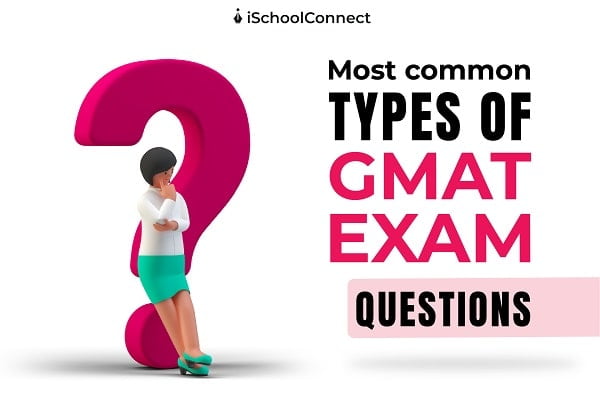Table of Contents
GMAT Preparation
GMAT, like most other international qualifier examinations, has a set of important questions that are often repeated after specific intervals. So, when you begin your GMAT prep, refer to some of these questions to get a head start. You might secure a great GMAT score by practicing such common question types.
Let’s dive into what the exam is and the types of questions that appear in the GMAT test.
GMAT Exam | Overview
The Graduate Management Admission Test (GMAT) is a required qualifying test for admission to the world’s most prestigious management schools.
This exam tests you on the 4 sections:
- Verbal Reasoning
- Quantitative Reasoning
- Integrated Reasoning
- Analytical Writing Assessment
Any GMAT practice questions paper will have all of these categories. Now, let’s look at a curated list of some common types of questions in each section.
Want to Study Abroad: Check These Countries
| GMAT Eligibility 2024 | |
| GMAT Syllabus 2024 | |
| GMAT Exam Pattern 2024 |
What is the GMAT Question Paper Format?

How many questions does the GMAT exam have? What is the format? Students often wonder about these things while preparing for the exam. If you can relate to this, look no further because we have the answer for you right here.
The GMAT exam spans three and a half hours including breaks.
The 4 sections of this exam comprise 80 questions:
- Quantitative Reasoning- 31 questions for which you will have 62 minutes.
- Verbal Reasoning- 36 questions that will take approximately 65 minutes to complete.
- Integrated Reasoning- 12 questions that you need to complete within 30 minutes.
- Analytical Writing Assessment- 1 question that you need to answer in 30 minutes.
Section- wise questions for GMAT Prep
Since there is a time constraint to complete each section, it is always better to go prepared. Ask us how? Know the most common questions asked in these sections and be well-equipped for the exam.
1. GMAT Prep Common Quantitative Reasoning Questions
Students are quite apprehensive while attempting GMAT math section. So, let’s begin with the list of most common math questions.
| Quantitative Topics | Most Common Questions |
| Integers | Remainder, factors, multiples, prime factors, and LCM & GCD |
| Fractions & Decimals | Rounding numbers, types of fractions, decimal conversions, and number lines |
| Ratios & Proportions | Ratio properties, work rate properties, and percentage calculations |
| Algebra | Factoring, polynomial equations, algebraic questions, profit, loss, and discount problems |
| Inequalities | Fundamental concepts, properties and question & condition relationships |
| Absolute Value | 4 properties, 7 frequent cases, questions related to the distance between x & y on number lines, etc. |
| Permutations & Combinations | Factorials, combinations, permutations with same & different letters, etc. |
| Probability | Probability of events and number & ratio relationships |
| Statistics | Mean, mode, median, range, and standard deviation |
| Geometry | Pythagoras theorem, properties of shapes like circles, triangles, cubes, cylinders, spheres, as well as problems related to the area of geometric shapes |
| Set Theory | Venn Diagrams, intersections, unions, complements, and addition rule |
2. GMAT Prep Common Verbal Reasoning Questions
If you think the verbal section in your GMAT test is the easiest, you are mistaken! It is this section that most students underestimate and end up being underprepared for.
Here are some of the most common topics that appear in the verbal section of the GMAT test. Prepare well!
A. Reading Comprehension
You can practice some of these questions from the numerous GMAT practice tests available online.
-“What does the author wish to convey with these lines?”
-“Why did the author use these words in describing XYZ?”
This section also has questions that seek to identify the examinee’s ability to understand what is and what is not being stated by the author. Here’s one among many such GMAT example questions:
– “What does the author not talk about in the given passage?”
B. Critical Reasoning
The next section in the verbal GMAT test consists of 3 main types of questions:
- weaken the argument
- strengthen the argument
- find the assumption
You may be given a short paragraph with a few arguments. The multiple-choice questions (MCQs) that follow will assess your ability to either strengthen or weaken the argument provided.
C. Sentence Correction
If you’ve ever given a practice test for GMAT, you will notice that this section has GMAT practice questions in 2 main categories:
- Logical predictions
- Rhetorical constructions
The former assesses your ability to correct sentences in the right logical order of words. The latter, on the other hand, tests your ability to form clear, powerful, and direct sentences.
3. Common Integrated Reasoning Questions

While the quantitative section may be important, the integrated reasoning section should not be ignored either. This section contains 4 types of common questions that you will need to revise thoroughly to get a good GMAT score.
Some common question-types in Integrated Reasoning include:
A. Multi-source Reasoning
As the name suggests, these questions will direct you to collate and analyze data given in different sources. The data can be given in tables, charts, or both.
Here’s an example for you to get an idea of what we are talking about: You may be given a series of tables and charts that depict the sales volume and price of products for a company along with the sales volume of competitors. Based on these data, you will be asked to answer “Yes” or “No” for a series of statements.
B. Table Analysis
Similarly, for table analysis questions, you will be given a table of data based on which you have to answer “Yes” or “No” for a series of statements. Therefore, to enter the highest ranks of the GMAT club, you will need to have a good understanding of data interpretation.
C. Graphics Interpretation
These types of questions contain one or more graphical charts based on which you will have to answer an MCQ. Getting these questions right can be crucial to maintaining a decent GMAT score.
D. Two-part Analysis
One of the most challenging questions is the two-part analysis type. It involves reaching the final answer using the second step of analysis based on the findings of the first step of the analysis.
4. GMAT Prep Analytical Writing Assessment Questions
It is possibly one of the most scoring sections, which will help you bag a higher GMAT score. These questions are highly subjective. Here are some things to keep in mind about this section:
- You will get a short paragraph with an argument and reasoning.
- Provide an analysis of why this argument is sound or not.
- Answer the question in 300-500 words and keep it to the point.
Key Takeaways
- With a high GMAT score, you will be eligible for admission into the world’s best management universities that can guarantee a bright future ahead. So, make sure you prepare well and ace the exam.
- Apart from these questions, you could also search for additional resources to aid your preparation.
- Make sure that you have sufficient time to revise these common questions and register for your exam accordingly.
Till then, keep practicing!
If you need any help to achieving your target GMAT score, we’d be happy to assist you. You just need to reach out to us, or drop a comment below!
Liked this blog? Read next: GMAT Colleges: Top Universities Accepting GMAT Scores
FAQs
Q1. How to register for the GMAT exam?
Answer- You can register for the GMAT exam online from its official website by filling in all the required details.
Q2. What happens after a failed attempt at GMAT?
Answer- Don’t worry; you can sit for the GMAT exam up to 5 times a year. So, you will get chances even if you fail once.
Q3. What is the best way to prepare for GMAT?
Answer- The best way to prepare for GMAT is to keep attempting and solving practice papers. Also, we advise you to analyze the most common GMAT questions thoroughly.
Q4. Can I use a calculator during the quantitative questions?
Answer- There will be a digital calculator on your screen during the test. You will also get a scratchpad for doing manual calculations.






